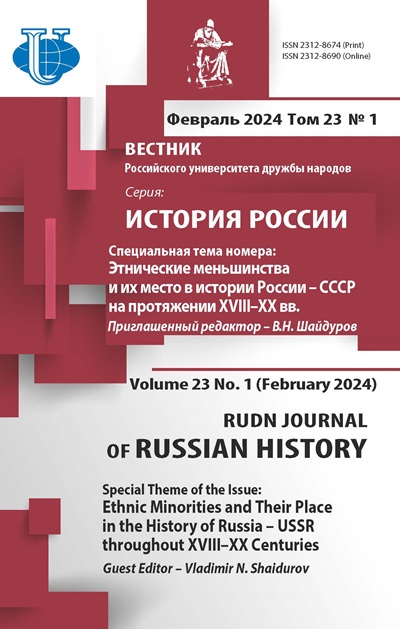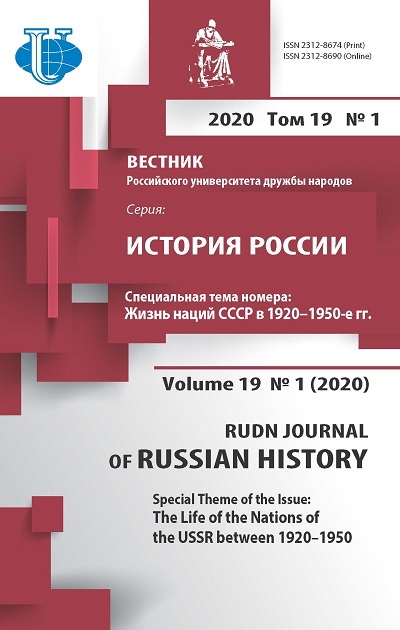Eurasianists on the Role of Orthodoxy and the Church in the National State Development of Russia
- Authors: Bazavluk S.V.1
-
Affiliations:
- RUDN University
- Issue: Vol 19, No 1 (2020): THE LIFE OF THE NATIONS OF THE USSR BETWEEN 1920-1950
- Pages: 254-268
- Section: OVERVIEW OF HISTORIOGRAPHY
- URL: https://journals.rudn.ru/russian-history/article/view/22995
- DOI: https://doi.org/10.22363/2312-8674-2020-19-1-254-268
Cite item
Full text / tables, figures
Abstract
The author analyzes the ideological views of a group of Russian migrants of the fi rst wave, known as Eurasianists, including N.S. Trubetskoy, P.N. Savitsky, N.N. Alekseeva, L.N. Karsavina and others. The author discusses fundamental elements of the classical Eurasianist program, such as the role of the Orthodox Church and the state in the life of Russia and its society, their attitude to Roman Catholic culture, and their place in dialogue with other religions. In addition, other important elements of Eurasianism noted here are the ideas of pan-Eurasian nationalism, ideocracy, the spatial borders of Russia-Eurasia, the symphonic personality, a guarantee state. These issues are associated directly with the authors of these concepts and with Eurasianism in general. The author demonstrates the continuity with the teachings of the Slavophiles and highlights the special attention that the Eurasians paid to the traditional cultures of Russia. Also noted is the interest in Eurasianism of church circles in exile in Europe. At the same time, the Eurasianists’ critical vies on the “Petersburg period” in the history of the Russian church are highlighted, which are also implicit in Eurasianism as an independent ideological and philosophical line of thought of Russian emigration in the fi rst half of the twentieth century. An attempt is made to show how, through conservative thought, Eurasians tried to form a new type of political identity. This ideological direction with an emphasis on spirituality and special institutions was considered by Eurasians as a prototype of the future statehood of Russia as opposed to the Soviet-Marxist system. In the context of the contemporary Eurasian integration (EAEU), of the current role of the Russian Orthodox Church and external political manipulations around the role of the Moscow Patriarchate, the theoretical views of the Eurasians take on a new dimension.
Keywords
About the authors
Sergey V. Bazavluk
RUDN University
Author for correspondence.
Email: bazavluk-sv@rudn.ru
Senior Lecturer at the Department of Theory and History of International Relations, Vice Rector for Student Aff airs
6, Miklukho-Maklaya St., Moscow, 117198, RussiaReferences
- Alekseyev, N.N. Russkiy narod i gosudarstvo. Moscow: Agraf Publ., 1998 (in Russian).
- Bromberg,Ya. Yevrei i Yevraziya. Moscow: Agraf Publ., 2002 (in Russian).
- Danilov, S.I. Sotsial’naya fi losofi ya yevraziystva: istoki, sushchnost’, sovremennoye sostoyaniye. Moscow: Russian State Social Institute Publ., 1994 (in Russian).
- Dugin, A.G. Yevraziyskiy put’ kak natsional’naya ideya. Moscow: Arktogeya-Tsentr Publ., 2002 (in Russian).
- Dugin, A.G. Yevraziyskaya missiya Nursultana Nazarbayeva. Moscow: Pubmixcom Publ., 2002 (in Russian).
- Dugin, A.G. Proyekt «Yevraziya». Moscow: EKSMO Publ., 2004 (in Russian).
- Dugin, A.G. Yevraziyskiy revansh Rossii. Moscow: Algoritm Publ., 2014 (in Russian).
- Florovskiy, G. Iz proshlogo russkoy mysli. Moscow: Agraf Publ., 1998 (in Russian).
- Fedorov, A.I. “The origins of Eurasian ideology in Russian Slavophilism.” Tambov University Review, no. 7 (2010): 158–160 (in Russian).
- Gavrish, M.A. Politicheskaya transformatsiya sovremennogo rossiyskogo yevraziystva. Rostov-naDonu: RYUI Publ., 2003 (in Russian).
- Gadzhiyev, K.S. Vvedeniye v geopolitiku. Moscow: Logos Publ., 2000 (in Russian).
- Glushkova, S.I. “The legal ideal of N.N. Alekseev.” Sofi a: Journal of the Society of Adherents of Russian Philosophy, no. 2–3 (2001): 50–75 (in Russian).
- Gumilev, L.N. Ritmy Yevrazii. Moscow: AST Publ., 2007 (in Russian).
- Gumilev, L.N. Yevraziya. Moscow: Ripol Klassik Publ., 2018 (in Russian).
- Karrer d’Ankoss, E. Yevraziyskaya imperiya. Istoriya Rossiyskoy imperii s 1552 g. do nashikh dney. Moscow: ROSSPEN Publ., 2010 (in Russian).
- Khoruzhiy, S.S. “Zhizn’ i ucheniye L.P. Karsavina.” In L.P. Karsavin. Religiozno-fi losofskiye sochineniya, 30–55. Moscow: Renessans Publ., 1992 (in Russian).
- Kurylev, K.P., Bazavluk, S.V., Savin, L.V., and Yurtayev, V.I. “Eurasia and Eurasianism in the XII Century: Security, Identity and Culture of Alliances.” Information Wars, no. 3 (2019): 47–51 (in Russian).
- Kurylev, K.P., Stanis, D.V., Barannik, M.A., and Zakaryan, S.B. “Eurasian ideology in the foreign policy of modern Russia.” Bulletin MRSU. History and Political Sciences, no. 4 (2019): 151–165 (in Russian).
- Laryuel’, M. Ideologiya russkogo yevraziystva ili Mysli o velichii imperii. Moscow: Natalis Publ., 2004 (in Russian).
- Laruelle, M. “Moscow’s China dilemma: evolving perceptions of Russian security in Eurasia and Asia.” In Eurasia’s Ascent in Energy and Geopolitics. Rivalry orpartnership for China, Russia, and Central Asia?, 76–91. London: Routledge, 2012.
- Laruelle, M. “The European Union.” In A Reconnecting Eurasia. Center for Strategic and International Studies, 10–15. London: Foreign Economic and Security Interests, 2016.
- Parvulesko, Zh. Putin i Yevraziyskaya imperiya. Moscow: Amfora Publ., 2006 (in Russian).
- Povilaytis, V. “Unknown articles of L.P. Karsavin.” Studies in Russian Intellectual History, no. 6 (2003): 160–169 (in Russian).
- Polovinkin, S.M. “Yevraziystvo i russkaya emigratsiya.” In N.S. Trubetskoy. Istoriya. Kul’tura. Yazyk, 731–762. Moscow: Progress Publ., 1995 (in Russian).
- Rey, M.-P. La Russie face à l’ Europe. Paris: Flammarion Publ., 2016 (in French).
- Savitskiy, P. Kontinent Yevraziya. Moscow: Agraf Publ., 1997 (in Russian).
- Savitskiy, P.N. Nauchnyye zadachi yevraziystva. Stat’i i pis’ma. Moscow: Dom russkogo zarubezh’ya im. A. Solzhenitsyna Publ., 2018 (in Russian).
- Samokhin, A.V. Yevraziystvo kak ideyno-politicheskoye techeniye v Rossii XX veka. Moscow: MGOU Publ., 2004 (in Russian).
- Sachko, G. “Eurasianism and the concept of foreign policy of modern Russia.” Bulletin of Chelyabinsk State University 10, no. 1 (2003): 46–55 (in Russian).
- Serio, P. Struktura i tselostnost’. Moscow: Yazyki slavyanskoy kul’tury Publ., 2001 (in Russian).
- Sobolev, A.V. “Eurasianism in the context of the soil tradition.” Herald of the Russian Christian Academy for Humanities, no. 1 (2007): 130–142 (in Russian).
- Suvchinskiy, P.P. “Sila slabykh.” In Iskhod k Vostoku: predchuvstviya i sversheniya, 5–12. Sofi ya: Rossiysko-Bolgarskoye knigoizdatel’stvo Publ., 1921 (in Russian).
- Tomsinov, V.A. “Legal Thought of Russian Post-Revolutionary Emigration: ‘Eurasian’ Theory of State and Law N.N. Alekseeva.” Journal of Legislation, no. 3 (2002): 84–88 (in Russian).
- Trubetskoy, N.S. Pis’ma k P.P. Suvchinskomu 1921–1928. Moscow: Russkiy put’ Publ.; Russkoye zarubezh’ye Publ., 2008 (in Russian).
- Tsygankov, A. “Mastering space in Eurasia: Russian geopolitical thinking after the Soviet break-up (Review essay).” Communist and Post-communist Studies 35, no. 1 (2003): 45–55.
- Wakim, J. Eurasia Vs the West. The Struggle for Hegemony in the Middle East. Beirut: Isticharia, 2018.
- Walberg, E. Postmodern Imperialism. Geopolitics and the Great Games. Atlanta.: Clarity Press, 2011.
- Yermishina, K.B. “N.S. Trubetskoy i yego rol’ v yevraziyskom dvizhenii.” In N.S. Trubetskoy. Pis’ma k P.P. Suvchinskomu 1921–1928, 7–12. Moscow: Russkiy put’ Publ.; Russkoye zarubezh’ye Publ., 2008 (in Russian).
















